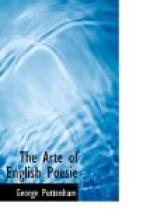CHAP. II.
Of proportion in Staffe.
Staffe in our vulgare Poesie I know not why it should be so called, unless it be for that we vnderstand it for a bearer or supporter of a song or ballad, not vnlike the old weake bodie, that is stayed vp by his staffe, and were not otherwise able to walke or to stand vpright. The Italian called it Stanza, as if we should say a resting place: and if we consider well the forme of this Poeticall staffe, we shall finde it to be a certaine number of verses allowed to go altogether and ioyne without any intermission, and doe or should finish vp all the sentences of the same with a full period, vnlesse it be in som special cases, & there to stay till another staffe follow of like sort: and the shortest staffe conteineth not vnder foure verses, nor the longest aboue ten, if it passe that number it is rather a whole ditty then properly a staffe. Also for the more part the staues stand rather vpon the euen nomber of verses then the odde, though there be of both sorts. The first proportion then of a staffe is by quadrien or foure verses. The second of fiue verses, and is seldome vsed. The third by sizeine or sixe verses, and is not only most vsual, but also very pleasant to th’eare. The fourth is in seven verses, & is the chiefe of our ancient proportions vsed by any rimer writing any thing of historical or graue poeme, as ye may see in Chaucer and Lidgate th’one writing the loues of Troylus and Cresseida, th’other of the fall of Princes: both by them translated not deuised. The first proportion is of eight verses very stately and Heroicke, and which I like better then that of seuen, because it receaueth better band. The fixt is of nine verses, rare but very graue. The seuenth proportion is of tenne verses, very stately, but in many mens opinion too long: neuerthelesse of very good grace & much grauitie. Of eleuen and twelue I find none ordinary staues vsed in any vulgar language, neither doth it serue well to continue any historicall report or ballade, or other song: but is a dittie of it self, and no staffe, yet some moderne writers haue vsed it but very seldome. Then last of all haue ye a proportion to be vsed in the number of your staues, as to a caroll and a ballade, to a song, & a round, or virelay. For to an historicall poeme no certain number is limited, but as the matter fals out: also a distick or couple of verses is not to be accompted a staffe, but serues for a continuance as we see in Elegie, Epitaph, Epigramme or such meetres, of plaine concord not harmonically entertangled, as some other songs of more delicate musick be.




